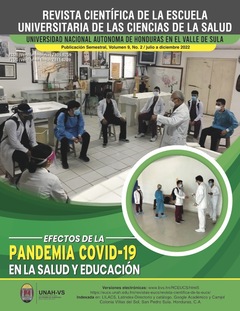Burnout syndrome and its association with sociodemographic factors in university teachers during virtuality
DOI:
https://doi.org/10.5377/rceucs.v9i2.17253Keywords:
Burnout, COVID-19, Faculty, Universities, TeachingAbstract
The COVID-19 pandemic caused an impact in all areas of the world, with health and education being the most affected. This caused them to spend more time learning new ways of teaching; whish caused stress and diseases related to the use of technologies, including the risk of suffering from Burnout Syndrome (SB). Objective: To determine burnout syndrome and its correlation with sociodemographic factors in teachers during virtual education in times of Covid-19, at the University School of Health Sciences of the National Autonomous University of Honduras-Valle de Sula (EUCS/UNAHVS) first semester 2022. Patients and Methods: Quantitative, descriptive-correla- tional, non experimental, transectional approach. Population 132. Convenience sample 73. Instrument: Maslach Burnout Inventory (MBI) questionnaire of 22 questions to which 18 questions were added for sociodemographic variable. Tabulation and analysis in SPSS 27.9, for the analysis parametric inferenctial statistics Pearson correlation and the P value were used. Results: 40% (29) nurses participated, 34% (25) dentists and 26% (19) doctors. The 30% (22) were 41-50 years old, 66% (48) had two jobs, 65% (47) taught virtual classes since the beginning of the pandemic. The 64% (47) did not manage the virtual campus, 80% (58) invested more time with their students, 88% (64) received tranning, 74% (54) presented a medium to moderate level y 26% (19) a high or deep level of SB. The Pearson correlation test was -0.66 with a significance level of 0.754. Conclusion: The teachers presented a medium and deep level of affectation by SB and there was no correlation or statistical significance between sociodemographic characteristics and SB.
Downloads
229




